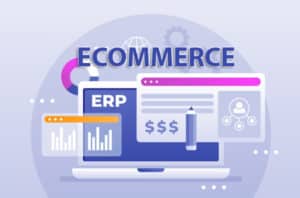news.metroandalas.co.id | ERP Ecommerce – ERP (Enterprise Resource Planning) is a specialized software solution designed to meet the unique needs of e-commerce businesses. It integrates various aspects of an e-commerce operation into a single, cohesive platform, helping businesses manage their online sales, inventory, customer data, and more efficiently. Here’s a detailed explanation of e-commerce ERP:
Key Components of E-commerce ERP:

- Order Management: E-commerce ERP systems allow businesses to efficiently process and track orders from multiple sales channels, such as online stores, marketplaces, and brick-and-mortar locations. This includes order processing, order tracking, and order fulfillment.
- Inventory Management: Effective inventory management is critical for e-commerce businesses. E-commerce ERP systems provide real-time visibility into inventory levels, helping businesses optimize stock, reduce overstocking or understocking, and improve order accuracy.
- Product Information Management (PIM): E-commerce ERP solutions often include PIM functionality, allowing businesses to centralize and manage product data, descriptions, images, and pricing. This ensures consistent product information across all sales channels.
- Customer Relationship Management (CRM): E-commerce ERP systems typically incorporate CRM features to help businesses manage customer data, track interactions, and personalize marketing efforts. This enhances customer engagement and retention.
- Financial Management: Managing finances is crucial for e-commerce businesses. E-commerce ERPs include accounting modules that handle financial transactions, invoicing, and financial reporting. This helps businesses maintain accurate financial records.
- Shipping and Logistics: E-commerce ERP systems often integrate with shipping carriers and logistics providers, streamlining the shipping process, generating shipping labels, and providing real-time shipment tracking information to customers.
- Multi-Channel Integration: E-commerce businesses often sell through multiple sales channels, including their website, third-party marketplaces (e.g., Amazon, eBay), and physical stores. E-commerce ERP systems centralize operations across these channels, simplifying management.
- Analytics and Reporting: Robust reporting and analytics tools in e-commerce ERPs allow businesses to analyze sales trends, track key performance indicators (KPIs), and make data-driven decisions.
- E-commerce Marketing: Some e-commerce ERPs include marketing automation features, helping businesses create and execute marketing campaigns, track their effectiveness, and segment customer lists for targeted marketing.
Benefits of E-commerce ERP:
- Efficiency: E-commerce ERP systems streamline operations, reducing manual data entry and the risk of errors. This results in faster order processing, improved inventory control, and reduced operational costs.
- Scalability: E-commerce ERPs are scalable, allowing businesses to adapt to growth and changing market demands. Additional features and users can be easily added as needed.
- Customer Experience: By centralizing customer data and order history, e-commerce ERP systems enable personalized customer experiences, such as customized product recommendations and promotions.
- Inventory Accuracy: Real-time inventory tracking ensures that businesses always know their stock levels, reducing the risk of overselling or stockouts.
- Data Security: E-commerce ERP systems typically include security features to protect sensitive customer and financial data, helping businesses maintain trust with their customers.
- Competitive Advantage: E-commerce ERPs enable businesses to respond quickly to market trends and customer preferences, staying competitive in the fast-paced e-commerce landscape.
In conclusion, E-commerce ERP is a comprehensive solution tailored to the unique requirements of e-commerce businesses. It helps manage the end-to-end e-commerce process, from product listings and sales to inventory and customer interactions, ultimately enhancing operational efficiency and customer satisfaction.
Considerations for Implementing E-commerce ERP:
Implementing an e-commerce ERP system is a significant undertaking, and careful planning is essential for a successful deployment. Here are some considerations when implementing e-commerce ERP:
1. Data Migration:
- Transferring existing data, such as product information, customer records, and sales history, to the new ERP system is a critical step. Ensure that data migration is accurate to prevent disruptions in business operations.
2. Integration:
- Ensure that the e-commerce ERP seamlessly integrates with your existing software ecosystem, including your e-commerce platform, payment gateways, and other third-party applications. Smooth integration is vital for efficient operations.
3. User Training:
- Adequate training is essential for your team to effectively use the e-commerce ERP. Provide comprehensive training to employees who will interact with the system to maximize its benefits.
4. Scalability:
- Consider the scalability of the ERP system. Ensure that it can accommodate your business’s future growth and evolving needs. Scalability is crucial as your e-commerce operations expand.
5. Customization:
- Evaluate the level of customization offered by the ERP system. Tailor the system to match your e-commerce business’s specific processes and requirements.
6. Security and Compliance:
- Prioritize data security and compliance with data protection regulations. Ensure that the ERP system employs robust security measures and offers features such as encryption and access controls.
7. User Acceptance Testing (UAT):
- Conduct thorough user acceptance testing before fully deploying the ERP system. This allows you to identify and address any issues or bugs before they impact your operations.
8. Continuous Support:
- Establish a support plan with the ERP provider. Timely support is crucial in addressing any issues or questions that may arise during daily operations.
9. Data Backups:
- Implement a robust data backup and recovery strategy. Regularly back up critical data to prevent data loss in the event of system failures or unforeseen incidents.
Conclusion
ERP Ecommerce systems are powerful tools that can significantly enhance the efficiency and competitiveness of online businesses. However, successful implementation requires thorough planning, integration with existing systems, data migration, and ongoing support. By carefully considering these factors and dedicating resources to the implementation process, e-commerce businesses can harness the full potential of their ERP systems to achieve operational excellence and provide exceptional customer experiences.